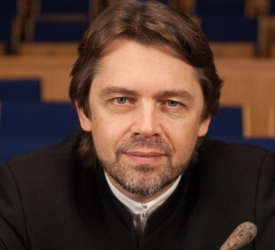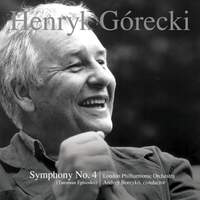Recording of the Week,
Henryk Górecki's Symphony No. 4
Henryk Górecki’s fourth and final symphony at last receives its premiere recording, originally planned for 2010 but postponed due to the composer’s illness and subsequent death. His son Mikołaj has completed the orchestration according to the notes left by his father, and prepared the work for performance by the London Philharmonic Orchestra under Andrey Boreyko.

The name of Górecki will likely be very familiar to most readers – as the Iron Curtain was coming down, this South Polish composer shot to fame with an accessible, often mournful sonority epitomised in his popular and instantly recognisable Third Symphony (Symfonia pieśni żałosnych, the Symphony of Sorrowful Songs). He was always frank about how much this success had taken him by surprise, and never seemed quite able to explain it himself; moreover, he felt at times that classical stardom had stood in the way of his being able to write new works.
With his Fourth Symphony it feels as if Górecki is decisively drawing a line under the “holy minimalist” sound of the Third; right from the beginning the sound-world is hard-edged and stern, with a forceful repeated motif in stark thirds that calls to mind the “statue” motif from Messiaen’s Turangalîla-Symphonie. The repetition of this seems to grow in oppressiveness throughout the brief first movement, capped by some grinding bitonality (juxtaposing chords based on A and E flat) and a series of dissonant hammer-blows for the full orchestra.
It seems as though this work couldn’t be more different from its predecessor, and that’s certainly true in terms of mood. Yet beneath the surface, the repetition of small cells that is so starkly clear in the first movement (and indeed throughout) is exactly the same technique that Górecki was beginning to use in his previous two symphonies, and which is so vital for the sense of stillness and eternity that permeates the Third. Here, the effect of that cell-based writing is more one of fragmentation than of meditative stillness – one thinks of the Stravinsky of the Rite of Spring, and indeed the Rite itself is closely recalled in the third movement by some boisterous trombone writing that could almost have been borrowed from the Jeux des cités rivals.
Inevitably, with a style characterised by the repetition of material rather than by constant development, there are frequent hints of the other “minimalist” composers (though none of them seem to have fully accepted this term, any more than did Górecki himself). In the final movement this influence comes to the fore particularly strongly, with some woodwind chordal writing that would not have sounded out of place in one of Glass’s symphonies. Towards the end the sonority of the work’s opening returns, with the repeated motto material and discordant chords bringing the symphony full circle. The seemingly inevitable brutal finale portended by those chords is deflected by the introduction of some tranquil major-mode material, and indeed the work closes in more optimistic mood than one might expect.
In all honesty I still don’t fully understand what makes this symphony tick, but it’s a gripping musical journey nonetheless. If Górecki’s cell-based writing seems at times to evoke the workings of some great inorganic mechanism, then Boreyko’s musicians can certainly be described as a well-oiled machine; their ensemble is tight, and the performance as a whole is taut and free of unnecessary sentiment (which would be alien, I think, to the spirit of the music).
Compared with some of the other contemporary repertoire we’ve reviewed lately, it has to be said that Górecki’s Fourth is not an immediately accessible work; it lacks the yearning wistfulness of Vasks, and certainly the overt showmanship of John Williams, and it definitely left a trail of bemusement in its wake in the Presto office earlier this week! But it’s a fascinating work that I’ve found repays repeated listening.
London Philharmonic Orchestra, Andrey Boreyko
Available Formats: MP3, FLAC, Hi-Res FLAC



